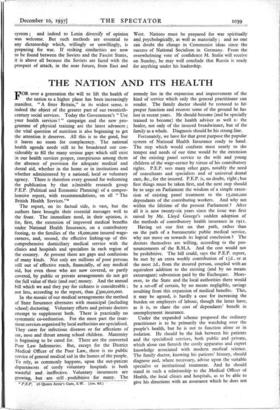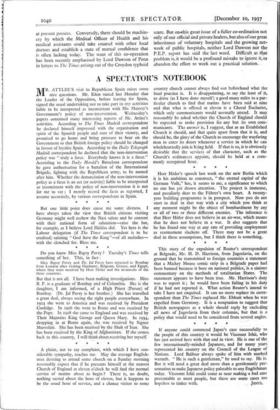THE NATION AND ITS HEALTH
FOR over a generation the will to lift the health of the nation to a higher plane has been increasingly manifest. "A fitter Britain," in its widest sense, is indeed the object of the greater part of our twentieth- century social services. Today the Government's "Use your health services ! " campaign and the new pro- gramme of physical training are the latest advances ; the vital question of nutrition is also beginning to get the attention it deserves. All this is to the good, but it leaves no room for complacency. The national health agenda needs still to be broadened out con- siderably to fill the many serious gaps which still exist in our health services proper, conspicuous among them the absence of provision for adequate medical and dental aid, whether in the home or in institutions and whether administered by a national, local or voluntary agency. There is therefore every ground for welcoming the publication by that atImirable research group P.E.P. (Political and Economic Planning) of a compre- hensive report, with recommendations, on all "The British Health Services."* The report, on its factual side, is vast, but the authors have brought their essential messages well to the front. The immediate need, in their opinion, is for, first, the extension of improved medical benefits under National Health Insurance, on a contributory footing, to the families of the 18,000,000 insured wage- earners, and, second, the effective linking-up of this comprehensive domiciliary medical service with the clinics and hospitals and specialists in each region of the country. At present there are gaps and confusions of many kinds. Not only are millions of poor persons still out of effective reach, financially, of any medical aid, but even those who are now covered, or partly covered, by public or private arrangements do not get the full value of their (and our) money. And the annual bill which we and they pay for sickness is considerable ; not less, according to the report, than £300,00o,000.
In the mosaic of our medical arrangements the method of State Insurance alternates with municipal (including school) doctoring. Voluntary efforts and private doctors attempt to supplement both. There is practically no systematic co-ordination. For the most part the treat- ment services organised by local authorities are specialised. They cater for infectious diseases or for affections of ear, nose and throat among school children. Maternity is beginning to be cared for. There are the converted Poor Law Infirmaries. But, except for the District Medical Officer of the Poor Law, there is no public service of general medical aid in the homes of the people. To rely, as commonly happens, upon the out-patient departments of costly vbluntary hospitals is both wasteful and ineffective. Voluntary insurances are growing, but . are. still, prohibitive for many. The • P.E:P. i6 Queen Anne's Gate, S.W. (xos. 6d:) remedy lies in the expansion and improvement of the kind of service which only the general practitioner can render. The family doctor should be restored to his proper function and recover some of the ground he has lost in recent years. He should become (and be specially trained to become) the health adviser as well a, the healer, not only of the insured breadwinner, but of the family as a whole. Diagnosis should be his strong line.
Fortunately, we have for that great purpose the popular system of National Health Insurance ready to hand. The step which would conform most nearly to the temper and needs of our time would be the extension of the existing panel service to the wife and young children of the wage-earner by virtue of his contributory rights. P.E.P. sees many other gaps, notably the need of consultants and specialists and of universal dental care, &c., for the insured. P.E.P. is, no doubt, right ; but first things must be taken first, and the next step should be to urge on Parliament the wisdom of a simple exten- sion of existing panel treatment to the 15,000,000 dependants of the contributing workers. And why not within the lifetime of the present Parliament ? After all it is now twenty-six years since the issue was first raised by Mr. Lloyd George's sudden adoption of the methods of contributory health insurance in 1911.
Having set our feet on that path, rather than on the path of a bureaucratic public medical service, why not move on towards its logical conclusion ? The doctors themselves are willing, according to the pro- nouncements of the B.M.A. And the cost would not be prohibitive. The bill could, says the P.E.P. report, be met by an extra weekly contribution of I;c1., or at the most 2c1., from the insured person, coupled with an equivalent addition to the existing (and by no means extravagant) subvention paid by the Exchequer. More- over, to the State and the local authorities there would be a set-off of certain, by no means negligible, savings resulting from this expansion of medical benefits. This, it may be agreed, is hardly a case for increasing the burden on employers of labour, though the latter have, as it is, to share the cost of dependants' benefit in unemployment insurance.
Under the expanded scheme proposed the ordinary practitioner is to be primarily the watchdog over the people's health, but he is not to function alone or in isolation. He should be the link between his patients and the specialised services, both public and private, which alone can furnish the costly apparatus and expert knowledge associated with modern medical science. The family doctor, knowing his patients' history, should diagnose and, where necessary, advise upon the suitable specialist or institutional treatment. And he should stand in such a relationship to the Medical Officer of Health, the local clinics and hospitals, as to be able to give his directions with an assurance which he does not at present possess. Conversely, there should be machin: ery by which the Medical Officer of 'Health and his • medical assistants could take counsel with other local doctors and establish a state of mutual confidence that is often lacking today. The want of this co-operation has been recently emphasised by Lord Dawson of perm in letters to The Times arising out of the Croydon typhoid scare. But on•rizis great issue of a fuller co-ordination not oxilr Of our official- and private healers, but also of our great inheritance of voluntary hospitals and the growing net-. work of public hospitals, neither Lord Dawson nor the 13.E.P. report has said the last word. Difficult as that problem is, it would be a profound mistake to ignore it, or abandon the effort to work Out a practical solution. _























































 Previous page
Previous page